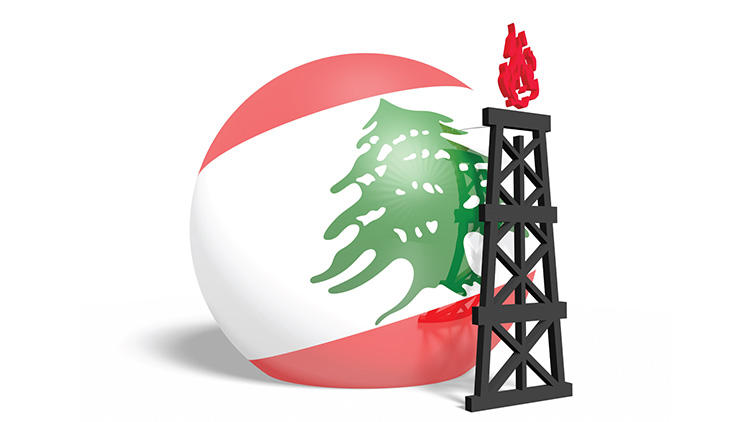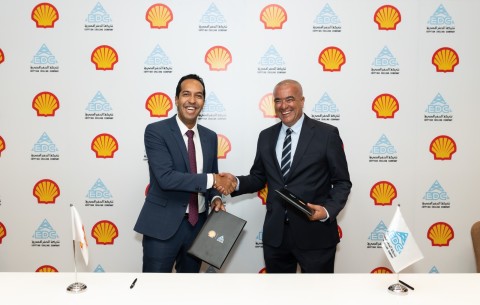By Sarah Samir
Lebanon’s first oil and gas offshore licensing round in the Mediterranean is raising concerns among experts over whether it will be compatible or competitive with the similar oil and gas ambitions of neighboring Egypt. On January 26th, 2017, Lebanon announced that blocks 1, 4, 8, 9 and 10 would be open for bidding as part of the first offshore licensing round in the country, aiming at developing the oil and gas sector and benefiting from its resources.
“We are hoping that the discovered gas quantities will be big enough in order to justify the field development and to satisfy the local demand and even to export it,” Abboud Zahr, Managing Director at DEP Levant Oil & Gas Company, told Egypt Oil & Gas. “The seismic surveys done until now in the Lebanese Offshore look promising, especially in the two awarded blocks 4 and 9,” he added.
According to Minister of Energy and Water, Cesar Abi Khalil, the exploration and production (E&P) in Lebanese offshore fields “is going to create a new sector in the economy, and will secure a local source for energy.” At the same time, experts say that Lebanon could benefit from Egypt’s experience in offshore drilling and infrastructure, especially after the 2015 discovery of Egypt’s mammoth Zohr natural gas field.
Lebanese Reserves
For years, studies have been showing that Lebanon has access for oil and natural gas reserves. “Studies indicated that there is nearly 1.7 billion barrels of technically recoverable oil and 122 trillion cubic feet of technically recoverable gas in the Levant Basin, of which part of each is found in Lebanon,” stated a Fransabank study entitled “Is Lebanon Really an Oil and Gas Producing Country?”
Lebanon owns “offshore oil reserves estimated to be anywhere between 440 [million] and 675 [million] barrels, and possibly as much as 96 [trillion] cubic feet (tcf) of offshore natural gas reserves, potentially worth a combined $300-$600 [billion],” according to an article written by Pinsent Mansons’ Senior Associate, Niazi Kabalan, under the title of “Lebanon – a new frontier for hydrocarbons.”
However, Lebanon “will not know how much gas or oil it actually has before it starts the actual drilling and makes some discoveries. Lebanon will start drilling its first exploratory well in 2019, and it is assumed that it will take between 3-5 years to know whether it actually owns gas or not,” Diana Kaissy, Executive Director at the Lebanese Oil and Gas Initiative (LOGI), told Egypt Oil & Gas.
Marine Borders
Lebanon is located on the eastern Mediterranean’s Levant Basin. The basin has several huge sub-sea natural gas fields, “including the Leviathan and Tamar fields located in Israeli waters near the disputed marine border with Lebanon,” Lisa Barrington and Dan Williams said according to a report published by Reuters.
Yet, “Lebanon implemented its block delineation as per its sovereign boarders. All of its blocks fall within its territorial waters,” said Kaissy, adding that Israel is “aiming at chipping off part of the Lebanese territory.” However, “Lebanon has taken the issue up with the relevant international bodies, [to the United Nations] (UN),” she noted.
Additionally, UN Spokesman, Stephane Dujarric, told media earlier in 2018 that “the UN is encouraging everybody to use diplomatic means to address these issues… The UN supports the right of both Lebanon and Israel to exploit their maritime resources in accordance with the international law of the sea.” Therefore, Lebanon’s exploration in the Mediterranean block should not face any political complications.
E&P Agreements
In order to govern E&P process, Lebanon’s cabinet issued the decree number 43 on January 4th, 2018, including the Tender Protocol (TP), which is related to offshore licensing rounds and to the Exploration and Production Agreement (EPA).
According to the EPA, “the Right Holders, [which are the companies signing the EPA], must pay royalties to the State, equal to 4% of the gas produced, and a varying percentage between 5% and 12% of the oil produced,” stated the Lebanese Petroleum Administration (LPA)’s article on the EPA.
Additionally, “a percentage, determined by bidding, of the oil and gas is allocated to the Right Holders to reimburse their costs. The remaining oil and gas is split between the State and the Right Holders in proportions determined by bidding under a formula pursuant to which the State’s share increases after the Right Holders have recovered their investment,” the LPA’s article explained. Moreover, the companies in the contract are subject to pay Lebanese taxes.
In January 2018, Lebanon signed its first EPA for exploration in the Mediterranean Sea. The contract was awarded to a consortium of companies consisting of Novatek, Eni, and Total for two offshore blocks. The consortium had been given a license for exploration in Block 4 and Block 9 in December 2017, as reported by the media. “The award of the two offshore blocks will have a positive impact on the economy once drilling activities start in 2019,” Abboud Zahr commented.
E&P to Economic Boom
Currently, Lebanon experts consider E&P activities as a way to flourish the stumbling economy. “The successful development of Lebanon’s gas resources could bring substantial economic benefits to an ailing economy and strengthen the country’s energy security,” Bassam Fattouh, Director of the Oxford Institute for Energy Studies and Professor at the School of Oriental and African Studies, University of London, told Natural Gas Europe.
At the same time, Lebanon depends on imports to cover its local consumption of fuel. “In 2013, Lebanon’s imports of oil and its derivatives amounted to $5.11 billion,” according to an article by Lana Fayad and Rayan Kouatly in Kouatly & Associates. Lebanon’s fuel consumption has recently reached 55,000 barrels of distillate fuel oil per day, 134,000 barrels of crude oil per day, 5.6 billion cubic feet of dry natural gas per day, and 7,500 barrels of liquefied petroleum gases per day, the article explained. Yet, with a promise of oil and gas production, Lebanon can decrease imports and shift to natural gas as fuel.
Egypt, Lebanon Future Hydrocarbon Relations
The Eastern Mediterranean is a promising place with treasures of oil and natural gas resources, according to experts. With several countries on the Mediterranean, relations are formed, whether these relations are based on competition or cooperation.
“This year, the [Lebanese] government is expected to launch a tender to acquire up to three floating storage and regasification units (FSRUs) to be located in Tripoli, Zahrani, and Salaata,” stated Mona Sukkarieh in her article “Lebanon’s oil & gas sector – What to expect in 2018.” Considering Lebanon’s location, if the country implemented import and export gas facilities, it could compete with Egypt on being a gas regional trading hub. However, Diana Kaissy stated that “with Zohr’s massive discovery of 30 tcf, it is unlikely as of yet that Lebanon will be competing with Egypt.”
Moreover, “Egypt chances to become a regional hub for gas export are very high, as its already existing infrastructure will help much in this regard,” Zahr explained. “I do not think Lebanon will compete with Egypt in terms of natural gas production, I see rather a cooperation, as the relations between the two countries are excellent and Egypt would give Lebanon a priority to use its two liquefied natural gas (LNG) plants if needed,” he added.
Egypt and Lebanon have a great chance for cooperation in the oil and gas industries, as experts believe. When Lebanon starts production, in case of surplus for exports, the country will have three routes to exports gas, according to Kaissy, through “pipelines extending from Lebanon to Cyprus, Greece, then to Europe; through floating liquefied natural gas (FLNG) to be sent to Egypt’s LNG plants; or through FLNG to be sent to Egypt’s LNG plants.”
Yet, the country’s choice for the export method will “depend on the political/security situation and the gas prices, to see which is more cost feasible and competitive to the international price markets,” Kaissy pointed out.
Lebanon could further cooperate with Egypt in terms of drilling operations and benefit from the North African country’s experience in drilling Zohr natural gas field. “Zohr was developed in a record time. Lebanon has to learn how to cooperate with the present operator once a gas field is discovered in order to start pumping gas as soon as possible and avoid any unnecessary delay,” Zahr stressed.
Additionally, Kaissy noted that “it is quite fortunate that the same company that made the Zohr discovery, Eni, will be operating in Lebanon’s deep-water,” expressing hopes that “their expertise will come in handy when handling [Lebanese] unexplored deep-water and help it make early discoveries.”
Until 2019, the region’s oil and natural gas key players will be anticipating the start of oil and drilling activities in Lebanon’s offshore blocks that might redefine the game or form new economic ties between the states. Egypt and Lebanon could perfectly benefit from each other to achieve the two Arab country’s energy goals.








